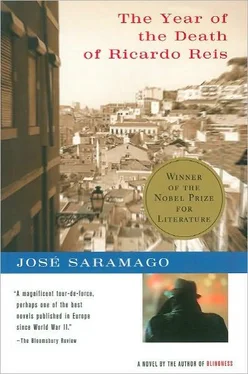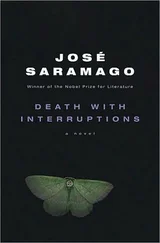José Saramago - Year of the Death of Ricardo Reis
Здесь есть возможность читать онлайн «José Saramago - Year of the Death of Ricardo Reis» весь текст электронной книги совершенно бесплатно (целиком полную версию без сокращений). В некоторых случаях можно слушать аудио, скачать через торрент в формате fb2 и присутствует краткое содержание. Год выпуска: 1992, ISBN: 1992, Издательство: Houghton Mifflin Harcourt, Жанр: Современная проза, на английском языке. Описание произведения, (предисловие) а так же отзывы посетителей доступны на портале библиотеки ЛибКат.
- Название:Year of the Death of Ricardo Reis
- Автор:
- Издательство:Houghton Mifflin Harcourt
- Жанр:
- Год:1992
- ISBN:9780547546926
- Рейтинг книги:4 / 5. Голосов: 1
-
Избранное:Добавить в избранное
- Отзывы:
-
Ваша оценка:
- 80
- 1
- 2
- 3
- 4
- 5
Year of the Death of Ricardo Reis: краткое содержание, описание и аннотация
Предлагаем к чтению аннотацию, описание, краткое содержание или предисловие (зависит от того, что написал сам автор книги «Year of the Death of Ricardo Reis»). Если вы не нашли необходимую информацию о книге — напишите в комментариях, мы постараемся отыскать её.
Year of the Death of Ricardo Reis — читать онлайн бесплатно полную книгу (весь текст) целиком
Ниже представлен текст книги, разбитый по страницам. Система сохранения места последней прочитанной страницы, позволяет с удобством читать онлайн бесплатно книгу «Year of the Death of Ricardo Reis», без необходимости каждый раз заново искать на чём Вы остановились. Поставьте закладку, и сможете в любой момент перейти на страницу, на которой закончили чтение.
Интервал:
Закладка:
Fernando Pessoa got to his feet, paced awhile up and down the study, lifted the sheet of paper on which Ricardo Reis had written the lines he had read, How did you express it, Not seeing the Fates who destroy us, we forget that they exist , one would have to be blind indeed not to see how the fates destroy us day by day, as the proverb says, There are none so blind as those who will not see. Fernando Pessoa put down the sheet of paper, You were telling me about Ferro, let's get back to where we were. During the awards ceremony, Antonio Ferro observed that writers who grumble under repressive regimes, even when the repression is purely intellectual, such as that which emanates from Salazar, forget that creative output has always increased during reigns of law and order. This idea of the benefit of intellectual repression, that the Portuguese have become more creative under the surveillance of Victor, is absurd. Then you don't agree. History itself disproves what Ferro claims, you need only think of your own youth, of Orfeu, tell me if that was a reign of law and order, although your odes, my dear Reis, if one looks at them closely, might be considered a paean to law and order. I never thought of them like that. But that is what they are, human unrest is futile, the gods are wise and indifferent, and above them is fate, the supreme order to which even gods are subject. And what of men, what is their function. To challenge order, to change fate. For the better. For better or for worse, it makes no difference, the point is to keep fate from being fate. You sound like Lydia, she is always talking about fate. Fortunately when it comes to fate, one can say whatever he likes. We were speaking of Ferro. Ferro is a fool, believing that Salazar is Portugal's fate. The Messiah. Rather the parish priest who baptizes, christens, and marries us, and commends our souls to God when we die. In the name of order. Exactly, in the name of order. As I recall, when you were alive you were much less subversive. When one dies, one sees things differently, and with this irrefutable sentence I take my leave, irrefutable because you, being alive, cannot possibly dispute it. Why are you reluctant to spend the night here. The dead should not fall into the habit of living with the living, just as the living should not keep the dead with them. Humanity consists of both the living and the dead. That is true, but not altogether true, otherwise you would not only have me here, you would have the Court of Appeals judge too and all the other deceased members of his family. How do you know a Court of Appeals judge lived here, I don't remember ever having told you. It was Victor. Which Victor, mine. No, a Victor who is dead but who also has a tendency to stick his nose into the affairs of others, not even death has cured him of this obsession. Does he stink of onion. He does, but it's bearable, the smell is gradually disappearing as time passes. Farewell, Fernando. Farewell, Ricardo.
There are signs that Salazar's intellectual repression is not spreading as effectively as intended by its prime mover. A recent episode right here on the banks of the Tagus showed its weakening influence, when the second-class dispatch boat João de Lisboa was launched with all due ceremony in the presence of our venerable Head of State. The boat is on the slipway, festooned, everything spick-and-span, the tracks greased, the wedges adjusted, the crew lined up on the quarterdeck, and His Excellency the President of the Republic, General Antonio Oscar de Fragoso Carmona, the very same who declared that Portugal is now respected throughout the world and that we should be proud to be Portuguese, arrives with his entourage, civilian and military, the latter in dress uniform, the former in tails, top hat, and striped trousers. The President, proudly stroking his handsome white mustache, proceeds with caution, perhaps on his guard not to repeat on this occasion the phrase he always uses when he is invited to open an exhibition of paintings, Very chic, very chic, most enjoyable. They are now mounting the steps to the platform, the highest dignitaries in the land, without whose presence not a single vessel can be launched, there is also a representative from the Church, the Catholic Church of course, from which advantageous blessings are expected, may it please Almighty God that this ship kill many and lose few. All present are proud to be part of this splendid occasion with its gathering of notables, curious bystanders, shipyard workers, and photographers and reporters. The bottle of sparkling wine from Bairrada awaits its moment of explosive glory, when lo and behold, the João de Lisboa begins to slip down the slipway though no one has as much as touched it. There is confusion, the President's white mustache quivers, puzzled top hats wave, and there goes the ship. As she enters the water, the crew shout hip hip hurrah according to custom, the seagulls soar, startled by the sirens of the other ships and also by the loud guffaws that echo now throughout the Ribeira de Lisboa. The shipyard workers, a particularly nasty lot, are clearly responsible for this insult, and Victor is already investigating the incident. The tide recedes, the hatchways even now give off the toxic stench of onion, the President withdraws in a rage as his entourage disperses in shame and indignation, he demands to know im-me-diately the names of those responsible for this unpardonable outrage against the dignity of our sailors not to mention the Fatherland in the person of its highest magistrate. Yes, Mr. President of the Council, says Captain Agostinho Lourenço, Victor's boss. But they cannot shake off the public ridicule, such fun, the whole of Lisbon is talking about it, even the Spaniards at the Hotel Brangança, although somewhat nervously, Cuídense ustedes, eso son artes del diablo rojo , but since these are matters concerning Lusitanian politics, they make no further comment. The dukes of Alba and Medinaceli arrange a visit to the Coliseu, an outing for the men only, to watch the terrifying, amazing wrestling contests featuring their compatriot José Pons, Count Karol Nowina a Polish nobleman, the Jewish wrestler Ab-Kaplan, the White Russian Zikoff, the Czech Stresnack, the Italian Nerone, the Belgian De Ferm, the Fleming Rick de Groot, the Englishman Rex Gable, and a certain Strouck whose nationality remains obscure, all champions extraordinaires of this other human spectacle, who have mastered the graceful art of slams and kicks, head butts and scissor holds, full nelsons and bridges. If Goebbels had to enter this ring, he would play safe and send the Luftwaffe on ahead.
It is precisely about planes and aviation that discussions are taking place in the capital now. As for the serious breach of discipline committed by certain members of the navy, we should mention in passing, since we shall not touch on the subject again, that despite Victor's investigations the culprits were not found, for no one believed that the incident of the Joào de Lisboa could possibly have been the work of a simple caulker or riveter. Since it is evident to everyone that the clouds of war are gathering over the skies of Europe, the Portuguese government has decided, by way of ex ample, which is the best lesson of all, to show its citizens what they must do to protect themselves in the event of an air raid. The name of the enemy is not mentioned, but everyone assumes that it is the traditional enemy, that is, Castilian, which is now Red. The range of modern planes is still very limited, so we are not likely to be attacked by the French, and even less by the English, who in addition happen to be our allies. As for the Italians and Germans, they have given so many proofs of friendship, our nations linked by a common ideal, that we are confident they will help us one day rather than attempt to exterminate us. Therefore the government has announced in the newspapers and over the radio that on the twenty-seventh of this month, the eve of the tenth anniversary of the National Revolution, Lisbon will witness a spectacle without precedent, namely a mock air raid somewhere in the Baixa, more technically it will be a demonstration of an attack by air with the purpose of destroying the Rossio railroad station and blocking all points of access to the aforementioned station by filling the area with tear gas. First a reconnaissance plane flies over the Rossio and marks the target with a smoke signal. Certain critics say that the attack would be far more effective if the planes dropped their bombs without giving any warning, what perverted disregard for the laws of chivalry. The moment the smoke rises in the air, the defense artillery fires a shot and the appropriate sirens sound, an alarm that no one could possibly fail to hear. The police, the National Republican Guard, the Red Cross, and the fire brigade go into action immediately, the population is evacuated from those streets at greatest risk, while emergency squads rush to offer assistance and fire engines, their hoses at the ready, head for the areas where fire is most likely to break out. Meanwhile the rescue teams have been assembled, and among them is the well-known actor of stage and screen, Antonio Silva, who leads a group of volunteer firemen from Ajuda. The squadron of enemy bombers, a fleet of biplanes, can now finally advance, they are obliged to fly low because their open cockpits are exposed to the rain and wind, and then the defending machine guns and antiaircraft artillery go into action, but since this is only a mock air raid, no planes are shot down, they swoop and attack without fear of reprisal, they do not even have to make the pretense of dropping bombs, the bombs explode by themselves down here in the Praça dos Restauradores, whose patriotic name could not save it if this were a real air raid. Nor was there any salvation for an infantry division that was heading for the Rossio, it was wiped out to the last man, we cannot imagine what they hoped to accomplish at a location which the enemy had humanely warned us was to be heavily bombed. Let us hope that this lamentable episode, a shameful blot on our army's reputation, will not be hushed up and that the General Staff will be brought before the Council of War for collective and summary execution by firing squad. The emergency services are beginning to feel the strain, stretcher bearers, nurses, and doctors selflessly struggle in the line of fire, collecting corpses, saving the wounded, the latter daubed with Mercurochrome and tincture of iodine, swathed in bandages that later will be washed and reused when there are real wounds to deal with, even if it means waiting another thirty years. Despite this heroic defense, the enemy planes launch a fresh attack, incendiary bombs land on Rossio Station, which is now devoured by flames and reduced to a pile of rubble, but our hopes of a final victory have not been entirely dashed, because there on his pedestal, bareheaded, miraculously unharmed, the statue of the king, Dom Sebastiáo, remains standing. Elsewhere the bombardment has caused havoc, fresh ruins now cover the old ruins of the Convento do Carmo, columns of smoke emerge from the Teatro Nacional, the casualties increase, on all sides are houses in flame, mothers scream for their little ones, children cry for their mothers, and husbands and fathers are forgotten, war is hell. In the sky overhead, the pilots, satanic, drink to the success of their mission with glasses of Fundador brandy, which also restores warmth to their frozen limbs now that the heat of the battle is waning. They make notes, draw sketches, take photographs for their dispatches, then, dipping their wings in derision, off they fly in the direction of Badajoz. We were right when we surmised that they had come from across the river Caia. The city has been transformed into a sea of flame, thousands have lost their lives, another earthquake has befallen us. Then the antiaircraft artillery fires a final shot, the sirens sound once more, and the exercise is over. The people leave their shelters and return to their homes, there are no dead or wounded, the buildings are still standing, it was all one huge joke. This, at any rate, is the program for today's spectacle.
Читать дальшеИнтервал:
Закладка:
Похожие книги на «Year of the Death of Ricardo Reis»
Представляем Вашему вниманию похожие книги на «Year of the Death of Ricardo Reis» списком для выбора. Мы отобрали схожую по названию и смыслу литературу в надежде предоставить читателям больше вариантов отыскать новые, интересные, ещё непрочитанные произведения.
Обсуждение, отзывы о книге «Year of the Death of Ricardo Reis» и просто собственные мнения читателей. Оставьте ваши комментарии, напишите, что Вы думаете о произведении, его смысле или главных героях. Укажите что конкретно понравилось, а что нет, и почему Вы так считаете.












